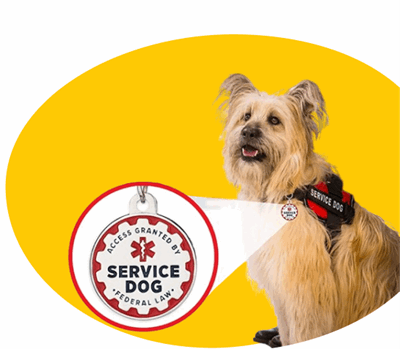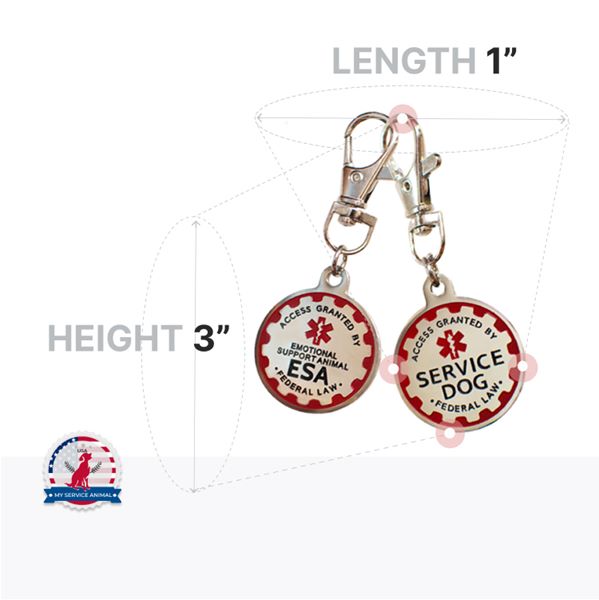USA National Service Animal Registry MyServiceAnimal offers wide selection of Assistant Animal Accessories
The Assistants Animal metal tag is a high-quality, durable tag made of metal. It is designed to be attached to a service animal or emotional support animal's collar to easily identify them as such. The tag does not contain any additional information about the pet to ensure the handler's privacy.
What Does a Service Dog Tag Look Like?
A service animal tag is a small identification tag or medallion that is worn by a service animal to indicate that it is a trained and certified service animal. The tag typically includes the words "service animal" or "emotional support". The tag is worn on the animal's collar or harness and serves as a visual indication to others that the animal is working and is not a pet. It's important to note that having a service animal tag does not make an animal a service animal.
While the ADA does not require the use of these tags, many service dog handlers prefer to use them to raise awareness and promote respect for their animal's role. The tag does not include any additional pet information and is designed to be simple and discreet. Order an Assistants Animal Metal Tag today and ensure your service animal is easily identified and respected in public spaces.
What is an emotional support animal tag?
An emotional support animal tag is a small identification tag or medallion that is specifically designed to be worn by an emotional support animal. The tag is usually attached to the animal's collar or harness and includes the words "emotional support" to clearly indicate that it is an ESA and not a pet. While it is not mandatory to have an ESA tag, it can help prevent confusion or misunderstandings in public spaces by visually identifying the animal as an ESA.
Assistant animal tags size
The size of the assistant animal tags is universal and designed to be visible on the animal's collar, regardless of its size. This ensures that the tag is easily identifiable and noticeable to those around, indicating the animal's status as an assistant animal.
Benefits to owning a service dog and emotional support tags
- Clear identification: A service dog tag clearly identifies the animal as a service dog, which can prevent confusion or misunderstandings in public spaces. This can help to ensure that the animal and its owner are treated with the respect and accommodations they are entitled to under the Americans with Disabilities Act (ADA).
- Safety: Support animal and service dog tags can help to ensure the safety of the animal by making it more visible to emergency responders or other officials in the event of an emergency or natural disaster.
- Access: ESA or ADA tags can help to ensure that the animal and its owner have access to public spaces, businesses, and transportation that are typically off-limits to pets.
- Peace of mind: Having a service dog tag can provide peace of mind for the owner, knowing that their animal is clearly identified as a service dog and that it is protected under the law.
- Professionalism: A service dog tag can enhance the professional image of the service dog and its owner and can be helpful in situations where the owner may need to prove that the animal is a service dog.
Why service dog tags and other accessories are essential
Many service dog owners prefer to carry the accessories with them in order to avoid uncomfortable questions related to their disability or health issues, as well as protect their privacy. Sometimes, when you go to the shop, cafe, or any other public establishment, employees there do not believe that your dog is trained specifically for your disabilities and not just there for fun. A tag or harness is like an indicator to those not aware of this ability of the dog.
Moreover, with the help of these items, it is also possible to spread public awareness on the topic of service dogs. Some people have never seen a service animal in action, so they can simply not understand they are different from regular pets. That means there will be no inappropriate pets, interactions, talks, or questions. And that is what most service dog handlers find very uncomfortable.